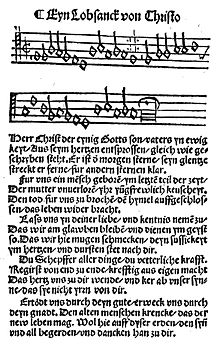Herr Christ, der einig Gotts Sohn
| "Herr Christ, der einig Gotts Sohn" | |
|---|---|
| Lutheran hymn | |
 Print in the Erfurt Enchiridion, 1524 | |
| Text | by Elisabeth Cruciger |
| Language | German |
| Published | 1524 |
"Herr Christ, der einig Gotts Sohn" (Lord Christ, the only Son of God) is a Lutheran hymn by Elisabeth Cruciger. Printed in 1524 in the Erfurt Enchiridion, together with 18 hymns by Martin Luther, it is one of the oldest Lutheran hymns.[1]
History
The hymn is based on a Latin Christmas hymn, "Corde natus ex parentis" (Born from his father's heart), by Aurelius Prudentius. "Herr Christ, der einig Gotts Sohn" was first printed in Johann Walter's hymnal Eyn geystlich Gesangk Buchleyn in Wittenberg in 1524. Titled "Eyn Lobsanck von Christo" (A song of praise of Christ) in the hymnal Enchiridion, the song is a praise of Jesus as the son of God and saviour of man, written for Epiphany. The text combines Lutheran teaching with medieval mysticism[1] which the author experienced as a nun before she converted.[2] Cruciger writes in the third stanza, for example: "so, daß wir hier mögen schmecken dein Süßigkeit im Herzen und dürsten stets nach dir" (that we may here taste your sweetness in our hearts and constantly thirst for you).[3] It was the first Protestant chorale to use mystical images, imitated in the Jesus mysticism of later generations. The tune is adapted from a secular love song, "Mein Freud möcht sich wohl mehren" (My joy may increase), in Wolflein Lochamer's song collection Lochamer-Liederbuch, published in Nürnberg around 1455.[1]
Philipp Nicolai refers to it in his hymn "Wie schön leuchtet der Morgenstern", both authors use the title "Morgenstern" (morning star) for Jesus.[3]
In the Enchiridion, the hymn appeared with 25 others, 18 by Martin Luther, three by Paul Speratus, one or two by Justus Jonas, one by Erhard Hegenwald, and one attributed to Jan Hus, making this the only hymn in the Enchiridion by a female author.[4]
The hymn appears in German Protestant hymnals for Epiphany, No. 67 in the current German Protestant hymnal Evangelisches Gesangbuch. It is the song of the week following the last Sunday after Epiphany.[2]
Musical settings
Hans Leo Hassler composed a four-part setting in 1608, Johann Hermann Schein set the song for two sopranos and basso continuo in 1622, and for four voices and basso continuo in 1627. Samuel Scheidt wrote a four-part setting in Görlitz in 1650.[3]
Johann Sebastian Bach used the hymn as the base for his chorale cantata [[[Herr Christ, der einge Gottessohn, BWV 96|Herr Christ, der einge Gottessohn, BWV 96]]] Error: {{Lang}}: text has italic markup (help) (1724), and used single stanzas in other cantatas.[3] Bach composed an organ prelude, BWV 601, part of his Orgelbüchlein.[1]
Georg Philipp Telemann composed two cantatas, both on a libretto by Erdmann Neumeister, in 1722 and 1758.[1]
Several composers wrote organ preludes, including Dieterich Buxtehude,[1] Johann Hermann Schein and Jan Pieter Sweelinck.
References
- ^ a b c d e f Browne & Oron 2008.
- ^ a b Kirchengucker 2013.
- ^ a b c d Browne & Oron 2009.
- ^ Brodersen & Brodersen 2008.
Bibliography
- Brodersen, Christiane; Brodersen, Kai (2008). Ein Enchiridion oder Handbüchlein geistlicher Gesänge und Psalmen (Erfurt 1524). Kartoffeldruck-Verlag, Speyer. ISBN 978-3-939526-03-2.
{{cite book}}: Invalid|ref=harv(help) - Browne, Francis; Oron, Aryeh (2008). "Chorale Melodies used in Bach's Vocal Works / Herr Christ, der einge Gottessohn". bach-cantatas.com. Retrieved 4 February 2013.
{{cite web}}: Invalid|ref=harv(help) - Browne, Francis; Oron, Aryeh (2009). "Herr Christ, der einge Gottessohn / Text and Translation of Chorale". bach-cantatas.com. Retrieved 4 February 2013.
{{cite web}}: Invalid|ref=harv(help) - Hahn, Gerhard/Henkys, Jürgen (ed.), Liederkunde zum Evangelischen Gesangbuch (= Handbuch zum Evangelischen Gesangbuch, Bd. 3), Heft 2, Göttingen 2001, ISBN 3-525-50321-0
- Kirchengucker (7 February 2013). ""Herr Christ, der einig Gotts Sohn": Elisabeth Cruciger". kirchengucker.de. Retrieved 23 February 2013.
{{cite web}}: Invalid|ref=harv(help) - Möller, Christian (ed.), Ich singe dir mit Herz und Mund. Liedauslegungen – Liedmeditationen – Liedpredigten. Ein Arbeitsbuch zum Evangelischen Gesangbuch, Stuttgart 1997, ISBN 3-7668-3525-4
- Thost, Karl Christian, Bibliographie über die Lieder des Evangelischen Gesangbuchs, Göttingen 2006, ISBN 3-525-50336-9
External links
- Herr Christ der einig Gottes Sohn (Sweelinck, Jan Pieterszoon): Scores at the International Music Score Library Project
- Herr Christ, der einig Gottes Sohn (Schein, Johann Hermann): Scores at the International Music Score Library Project
- Florian Ihsen: Liedpredigt im Kantatengottesdienst "Herr Christ, der einig Gotts Sohn" Erlöserkirche Munich, 13 February 2011 Template:De icon
- Herr Christ, der einig Gotts Sohn hymnary.org
